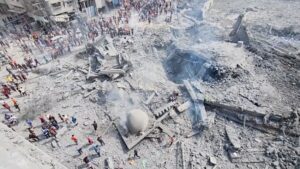
They followed evacuation orders An Israeli airstrike killed them the next day When Palestinians living in northern Gaza heeded the advisories issued by the Israeli military through phone calls, text messages, and flyers, urging them to relocate southwards, they believed they were moving towards a safer environment.
The Israeli Defense Forces released these guidelines on a Friday, instructing all civilians in northern Gaza to shift to areas south of Wadi Gaza for their own safety and that of their families. The IDF stated that they were making substantial efforts to minimize harm to civilians as they continued their operations in Gaza City.
Still, tragically, some Palestinians who followed these evacuation instructions and left their homes in pursuit of safety encountered the very danger they were trying to escape: Israeli airstrikes claimed lives outside of the designated evacuation zone.
These incidents highlight the grim reality that evacuation zones and alerts from the Israeli military do not ensure the safety of civilians in the densely populated Gaza Strip, where Palestinians have no secure refuge from Israeli airstrikes.
In the early hours of a Friday, Aaed Al-Ajrami and his nephew, Raji, were contacted by an Israeli military official who urgently instructed them to gather their loved ones and immediately move southwards, as recounted to CNN by Raji. Following these directives, Aaed’s family successfully relocated south of the evacuation zone. Tragically, despite their compliance, an Israeli airstrike claimed the lives of Aaed’s family the following day.
CNN obtained an audio recording of the phone call, shedding light on the concise conversation. In it, the IDF official instructed them to head south of the evacuation area without offering specific guidance on the route to take. Raji mentioned that upon realizing the identity of the caller, they recorded the conversation for the purpose of sharing it with other family members.j
The officer’s words were straightforward: “All of you go to the South. You and all your family members. Gather all of your belongings and head there.” When Aaed sought further information about the safest route and departure time, the officer responded, “It doesn’t matter which road. Do it as quickly as you can. Time is running out.”
Aaed diligently followed the warning and, come the break of dawn on Friday, led his family and relatives to take refuge with friends in Deir Al Balah, a city situated approximately eight miles south of Wadi Gaza, safely beyond the designated evacuation area.
Tragically, on the following day, an Israeli airstrike struck the vicinity, causing extensive damage to the building where Aaed’s family had sought shelter. This devastating incident claimed the lives of Aaed and 12 other family members, including seven children.
Aaed’s nephew, Raji, aged 32, was lodging in a nearby structure at the time. Upon hearing the deafening explosion, he feared the worst and swiftly made his way to the scene after receiving a call informing him of his uncle’s family being among the casualties.
Raji recounted the scene, saying, “The destruction was catastrophic. We began to rescue those who had been impacted by the explosion, some of whom miraculously remained alive. The smell of gunpowder hung heavy in the air, and dust enveloped everything.”
Martin Griffiths, the head of the UN Office for the Coordination of Humanitarian Affairs, expressed deep concern about the evacuation order affecting 1.1 million residents in northern Gaza, stating that it violates the principles of war and basic human decency. He made this statement late on Friday. The region’s infrastructure, including roads and homes, has been decimated, leaving the civilian population with no safe haven.
Raji, who has provided shelter for the surviving wounded children, described the emotional toll he bears. Despite his inner turmoil, he maintains a facade of strength to support the children.
“I am keenly aware of the injustice. These are innocent people. What have they done to deserve this?”


